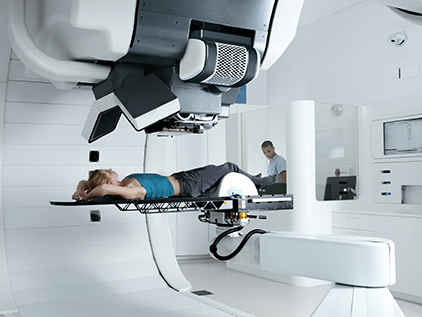- Home
- Types & Treatments
- Uterine Cancer
Uterine Cancer

Uterine cancer is the growth of abnormal cells in the lining of the uterus. The lining of the uterus is also known as the endometrium, so uterine cancer is also called endometrial cancer. Uterine cancer is the most common gynecologic cancer, and is the 4th most common cancer in women in the United States.
Uterine cancer usually can be cured when found early. Most of the time this cancer is found in its earliest stage, before it has spread outside the uterus. The uterine cancer specialists at The University of Kansas Cancer Center are leaders in the field. They work as a team to provide you with the latest advances in uterine cancer prognosis, prevention, diagnosis, treatment, and resources.
Uterine cancer usually can be cured when found early. Most of the time this cancer is found in its earliest stage, before it has spread outside the uterus. The uterine cancer specialists at The University of Kansas Cancer Center are leaders in the field. They work as a team to provide you with the latest advances in uterine cancer prognosis, prevention, diagnosis, treatment, and resources.
What is uterine cancer?
Abnormal cells that grow in the lining of the uterus lead to uterine cancer. When cancer cells grow in the uterus, they can spread and invade neighboring organs. They can also break away and spread to other parts of the body through the bloodstream or the lymphatic system.
Uterine cancer usually affects women over age 50. Though more common among Caucasian women than African-American women, the mortality rates for uterine cancer are higher among African-American women.
Another type of uterine cancer is uterine sarcoma, which affects the muscle of the uterus. Uterine sarcoma is treated differently than endometrial cancer. Because most uterine cancers are endometrial cancers, the information in this section addresses only endometrial cancer.


Uterine Cancer Symptoms and Risks
The most common uterine cancer symptoms are:
- Losing weight without trying
- Increased vaginal discharge
- Unexpected or abnormal vaginal bleeding after menopause
Most instances of abnormal bleeding and vaginal discharge are not uterine cancer symptoms.
We don’t know what causes uterine cancer, but some factors may increase your risk. We can help you find the best ways to change your behavior and reduce your risk. You are more likely to get uterine cancer if you have:
- A history of not ovulating
- A history of infertility
- A personal or family history of hereditary nonpolyposis colon cancer, also known as Lynch syndrome
- Had high exposure to estrogen over a period of time, which can be caused by:
- Estrogen replacement therapy without progesterone
- Early start of menstrual periods
- Late menopause
- Obesity
- Had polycystic ovary syndrome
- Never breastfed
- Never had children
- Used Tamoxifen (a medication that is sometimes prescribed to reduce breast cancer risk)
Diagnosis and screening for uterine cancer
Uterine Cancer Treatment
When found in its early stages, uterine cancer can be cured with surgery and close follow-up.
Your doctor may recommend a hysterectomy, which is surgery to remove the uterus, ovaries and fallopian tubes. These tissues will be examined to determine the stage and grade of your cancer. Lymph nodes near the uterus will also be examined to see if the cancer has spread. If the cancer has spread to the lymph nodes, they may need to be removed during the same surgery.
Hormone therapy is sometimes used to slow the growth of uterine cancer. Your doctor may prescribe progesterone or progestin (manmade progesterone), which are usually taken in pill form. Progesterone slows the growth of endometrial tissue, which can slow the growth of uterine cancer.
More advanced stages of uterine cancer may require radiation or chemotherapy:
- Radiation therapy uses high-dose X-rays to destroy cancer cells. Most uterine cancers are treated with radiation on an outpatient basis. Another option is for the doctor to place radioactive material inside your body. Your doctor may recommend this form of uterine cancer treatment after surgery to destroy remaining cancer cells, or as a primary treatment for uterine cancer if you cannot have surgery.
- Chemotherapy drugs kill cancer cells that remain in the body after surgery. Your doctor may recommend chemotherapy as your primary treatment if you cannot have surgery.
Your care team will review your medical history, blood tests, X-rays and scans to design a treatment plan for uterine cancer that is best for you. Your treatment plan will depend on your age, general health and the stage of your cancer.
Sometimes people with a uterine cancer diagnosis take part in clinical trials. Clinical research trials offer innovative new therapies and help find better ways of preventing, diagnosing and treating many types of cancer.

We are here for you, woman to woman.
The Woman to Woman program provides one-on-one emotional support and mentoring for women who are newly diagnosed with gynecologic cancer.
About the program
Why choose us for uterine cancer care
If you have uterine cancer, you will find the leading specialists you need at The University of Kansas Cancer Center. Our interdisciplinary team of fellowship-trained, board-certified gynecologic oncologists, radiation oncologists, radiologists and pathologists has years of experience treating hundreds of patients with uterine cancer. Doctors from throughout Kansas and the region often refer their patients to our specialists.
Our team offers some of the Kansas City metro region’s most advanced cancer treatments. We use the latest proven techniques and technologies to improve patient outcomes while reducing side effects. The University of Kansas Cancer Center uses the latest findings in cancer treatments and always strives to find new treatments that can improve the lives of our patients.
Our doctors, nurses and other staff work closely together to develop a treatment plan that best fits you. They discuss your treatment as a team to stay up-to-date on your care and progress. Your cancer center team will work with your community healthcare provider(s) to provide your treatment near your own home when possible. Because every person is unique, we tailor your cancer treatment to your personal needs.
As a National Cancer Institute-designated cancer center, we are committed to making a difference for patients using the latest, most advanced cancer treatments, innovative therapeutics and chemoprevention. We take part in numerous national clinical trials on cancer treatment, as well as develop our own clinical studies to improve cancer patient care and outcomes. You can benefit from our team’s exposure to the latest treatment options, and may be able to take part in a clinical trial for uterine cancer care during your treatment.
Start your path today.
Your journey to health starts here. Call 913-588-1227 or request an appointment at The University of Kansas Cancer Center.